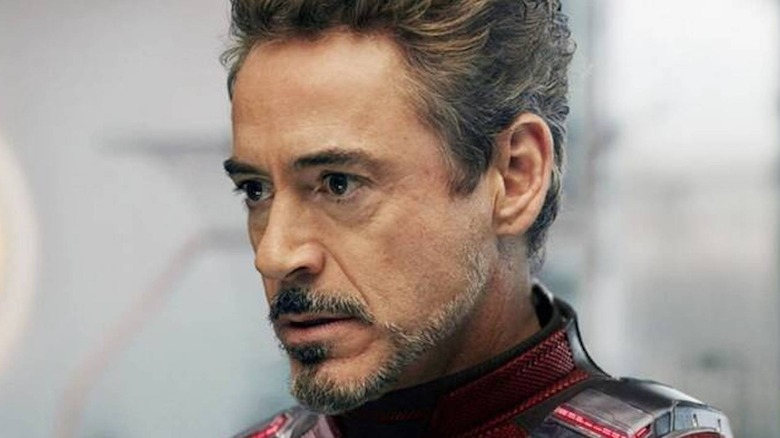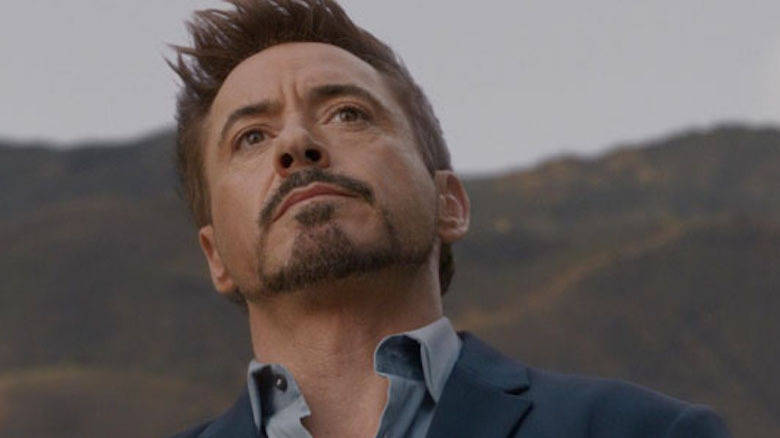Why Tony Stark's Storyline Makes No Sense In The MCU
2008's "Iron Man" kicks off the Marvel Cinematic Universe with Tony Stark (Robert Downey Jr.) stepping into the iconic red and gold suit for the first time. From there, the titular character has an interesting journey across the MCU as he grapples with his own inner demons, the villains he accidentally creates, and threats from throughout the cosmos. It all culminates in "Avengers: Endgame," when Tony makes the ultimate sacrifice to stop Thanos (Josh Brolin) from wiping out the entire universe. It's incredibly fitting that his story ends with sacrifice, since he starts off as a completely self-centered individual with a large ego.
Tony's death doesn't mean the MCU has forgotten him, of course, as he passes his legacy down to Peter Parker (Tom Holland) in "Spider-Man: Far From Home" — giving him the keys to E.D.I.T.H., an enhanced A.I. which grants him access to Stark Industries weaponry and satellites. Although, this causes havoc for the web-slinger when he's tricked into giving it to Mysterio (Jake Gyllenhaal), who only wants to use it for personal gain and revenge. Thankfully, Peter gets E.D.I.T.H. back by the end of "Far From Home," but it still seems a little reckless of Tony to give a teenager something this powerful.
Still, this is not the only time that Iron Man makes rash decisions over the years, and there's a chunk of Tony's storyline which makes no sense in the MCU.
Tony Stark is an indecisive Iron Man
Tony Stark continually struggles with the guilt of knowing his weapons are in the hands of his enemies. Despite claiming that he "successfully privatized world peace" by the time "Iron Man 2" picks up, the bad guys constantly get their hands on Stark Industries technology one way or another, whether it's Obadiah Stane (Jeff Bridges) suiting up as Iron Monger, Ivan Vanko (Mickey Rourke) building his own Arc reactor, or Ultron's (James Spader) villainous turn. So it's understandable that Tony considers giving up his heroic alter ego after defeating Aldrich Killian (Guy Pearce) at the end of "Iron Man 3."
The film comes to an end as Tony blows up all of his suits using the "Clean Slate" protocol, taking it as a sign that he can leave it all behind for Pepper Potts (Gwyneth Paltrow). That seems like the end of his superhero life, but soon enough, Tony suits up again for "Avengers: Age of Ultron." At the end of the second "Avengers" movie, the genius billionaire once again makes it clear that he's done with being a superhero, leaving the team in the hands of Steve Rogers (Chris Evans) and Black Widow (Scarlett Johansson). But then Iron Man returns once again in "Captain America: Civil War." It's like he can't make up his mind.
It's possible that this back and forth throughout the films is because Robert Downey Jr. was debating leaving the role during contract renegotiations in 2013 (via The Hollywood Reporter). He told GQ at the time "How many genre movies can I do? How many follow-ups to a successful follow-up are actually fun?" Leaving after 10 MCU films, Downey Jr. might finally know the answer.

